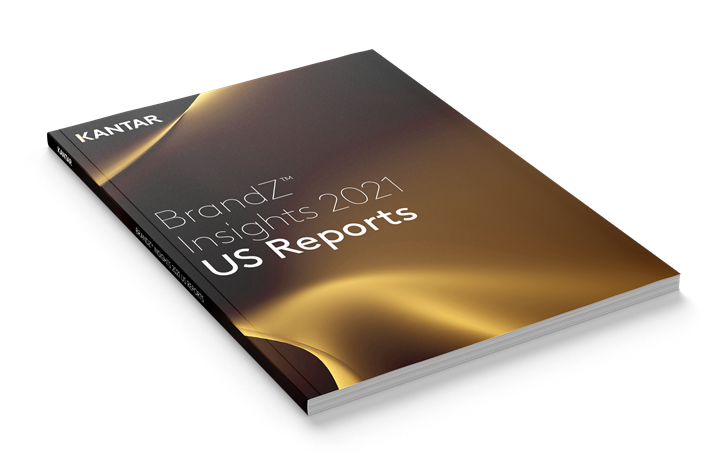Strong brands in the United States not only weathered the disruptions of a global pandemic, a contentious presidential election and national social unrest, they thrived during a year of rapid change. Because brands play a central role in American life, these forces presented unique challenges and opportunities.
In a new series of BrandZ™ Insights 2021: US Sector Reports, we’ve utilized our analytics and expertise throughout Kantar to help brand marketers better understand changing American consumer behavior and navigate successfully in a future that promises to be filled with surprises and disruptions, by exploring insights across five categories in the US: Banks, Business Solutions & Technology, FMCG, Media & Entertainment, and Retail. In each of our five sector reports, we look at how strong brand equity helps brands navigate market volatility. We also take a deeper dive into the brands that have set themselves apart on key metrics of brand growth - being Meaningful (meeting needs in relevant ways and/or building affinity), Different (being unique vs. competitors and/or setting trends) and Salient (coming quickly to mind).
Key trends highlighted in our latest analysis, across each major US sector, during the past year include:
Banks
After spending over a decade since the financial crisis being seen as part of the problem, many banks have regained trust by supporting local communities and facilitating the distribution of government stimulus checks to individuals and small businesses. The scores for banks rebounded on BrandZTM Indexes for Brand Love, Consumer Trust and Integrity, although bank scores on the indexes remained below average compared with all brands.
Business Solutions & Technology
Boosted by remote work and the resulting higher level of engagement with consumers throughout the pandemic, the most valuable BTB Technology Brands in this BrandZTM analysis scored significantly above average in key measurements of brand health and equity. The dependency by consumers upon brands traditionally considered B2B for work led to a B2B convergence with B2C of sorts, which such brands needing to communicate emotional values to consumers in addition to the typical functional values.
FMCG
Rapidly shifting behaviors and habits created both challenges and opportunities in this sector. Essential household merchandise became high in demand as health and hygiene became top concerns. Among the five market sectors analyzed in the BrandZTM reports, FMCG brands scored the highest coming out of the pandemic in areas related to positive consumer brand relationships.
Media & Entertainment
The spike in demand for at-home entertainment meant streaming brands needed to act creatively, while overall media brands contended with brand safety issues and depressed ad sales. Trust in US online sharing and networking brands suffered as brands attempted to balance their role as platforms for free expression with the need to prohibit objectionable content generated by the presidential election and reactions to the drive for racial justice.
Retail
For those prepared for omnichannel transformation, pandemic-related safety concerns that reduced traffic in physical stores and restaurants had little impact as people rushed to online experiences. Amazon has opened up a wide post-pandemic brand equity gap over competitors, according to BrandZTM analysis.
The report also examines cross-category trends that are reshaping the American brand landscape, such as the pivot to home, the emergence of new occasions, and the changing nature of loyalty and trust. Americans increasingly expect brands to inspire trust with consistent ethical behavior. Of the 75 brands analyzed for this report, the most trusted scored three times higher than the least trusted in Brand Power, a key measurement of equity.
Two key imperatives have emerged for brand growth: diversity and inclusion, and sustainability; and some of the most salient challenges facing brands going forward and forecasted changes in the media universe. Kantar’s US MONITOR 2020 research found that 79 percent of Gen Zers, 78 percent of Millennials, 65% of Gen Xers, and 61 percent of Boomers said it is important that the brands they buy take a stand to end racism. The majority of Americans said that sustainability remains a critical concern, according to Kantar’s COVID-19 Barometer research.
Overall, according to Kantar’s COVID-19 Barometer consumers’ regard for brands has increased since the pandemic. When comparing 128 brands across 10 categories, BrandZ™ analysis found a rise in the percentage of consumers who thought brands are worth what they cost – or even more than they cost. Our BrandZ™ analysis once again confirms the importance of strong brands; the share prices of strong brands declined less and recovered more quickly, and strong brands delivered higher shareholder returns.
To access all five sector reports click here www.kantar.com/campaigns/brandz/us


